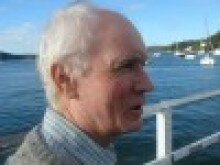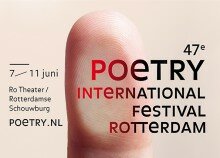
Peter Boyle is an Australian poet living in Sydney. His first three collections of poetry Coming home from the world (1994), The Blue Cloud of Crying (1997), and What the painter saw in our faces (2001) have received several awards including the New South Wales Premier’s Award, the South Australian Festival award and the National Book Council Award. His latest collection of poetry, Museum of Space, published in 2004 by University of Queensland Press, was shortlisted for the Queensland Premier’s Award. In 2004 he was shortlisted for the NSW Premier’s Award for translation.
Boyle has read his poetry at numerous festivals including International poetry week, Caracas (2004), the Medellín International Poetry Festival (1997), and the Festival de Poésie anglo-français, Paris (1999). His poems have been published in such magazines as slope, Verse, Jubilat and Three Candles in the USA; Heat, Island, Southerly, Salt, Overland (Australia); Poetry Review and Shearsman (UK). His poetry has appeared in translation in La traductière and Poésie / Première (France), Prometeo and Revista Casa de Silva (Colombia), Hoja Verde (Chile) and Alhucema (Spain). His translations of French and Spanish poetry have appeared in such reviews as American Poetry Review and Jubilat. A selection of his translations of César Vallejo, I am going to speak of hope, was published in 1999 by the Peruvian Consulate, Sydney. Translations from French poets, notably Pierre Reverdy, René Char and Yves Bonnefoy, have appeared in Jubilat and Verse (US) and Shearsman (UK).
In 2004, a collection of his translations The Trees: selected poems 1967 – 2004 by Eugenio Montejo was published by Salt publishing (UK). This is the first bilingual edition of the poetry of Eugenio Montejo and represents more than six years’ work in the translation of Eugenio Montejo’s poetry. He has recently translated poetry by the Australian-based Chilean poet Juan Garrido-Salgado; a collection of these poems was published in the book Unmoving Navigator who fell in love with the ocean’s darkness/ Navegante immóvil, que amó en la oscuridad del océano (2006).
Boyle’s work has always been marked by the timbres and sensuality of Spanish, and the particular and subtle melancholy of South America, which is not unusual considering Boyle has translated many of the great Spanish-language poets, and to a large degree it was within these reference points, coupled with his abiding engagement with the work of Char, Reveredy and Bonnefoy, that I saw his work: a gentle but profound mix of the melancholy and surreal, a dirge made of earth and blood, of the estrangement of language to the senses and their inextricable embrace.
With the Apocrypha of William O'Shaunessy, Boyle has exponentially, perhaps infinitely considering the gaps and fissures he creates as much as those that he fills, expanded his inscribed universe and with its publication will surely step to the forefront of contemporary Australian writing. Teasingly enough, Boyle has yet to place the Apocrypha with a publisher (I hope a bidding war ensues from the samples published here). The Apocrypha spans the vistas of the pre-Socratics, Plato’s Academy, Pliny’s Naturalis Historia, the burgeoning of the Dark Ages, and the birth of nineteenth century philology as it presents the various translations of lost works by Boyle's fictive Classicist contemporary, William O’Shaunessy. Among the Apocrypha are Photius of Aegispotami, “Against Pythagoras”; Xenophon, Conversations from the last years of Socrates; Herodotus, The Uncut Histories; Diogenes Caserius, The Deeds of the Neglected Emperors; Catullus, The Sermione Notebooks; and the mesmerising poetry of the variously coloured books of Ebetesum.
Boyle draws on the lacunae of history and historiography, of literature and philosophy, but most of all philology — equally as “a love of words” and a study into their origins — forming a prodigious reimagining and so reinvention of not only the foundations of Western thought but a reinscription of its physical, metaphysical and temporal constraints. Stepping from, say, the Timaeus and Critias, where Plato re-examines the physical, metaphysical, psychological and social principles governing the world, and also introduces Atlantis to world literature, into the Apocrypha, readers will find an impressive and successful effort to redraw the maps of the thought and the imagined, creating a world as baffling as it is convincing. Poetry and paradox proliferate into a miraculous experience of being, wherein the union of language and sense is exacting and immediate.
The Apocrypha suggests the same desires for power and prestige that rule the present moment ruled over and ruined the lost ages and cultures it chronicles, and in many ways unfolds as both a celebration of the vertiginous possibilities of language and meditation, and a plaint against the same violence, myopia and self-interest that still savages the world. While an apparent long-study into the classics of Greek and Roman thought and natural history guides the Apocrypha, Boyle masterfully creates an athenaeum of the imagination that recalls the same intelligence and mordent humour that first set about building Tlön, Uqbar, and the Library of Babel, reveling in the interplay of worlds so close together, fluctuating between thought and sense, the familiar and the strange.
In the worlds of the Apocrypha, the reader will discover instances of metaphor as ontology and of language as experience. Boyle draws back the veils of time and culture, offers the reader a share in the beauty and joys of language, and sets forth the commonality of love, compassion, justice, pity and ethics that might bind us beyond ourselves into a community as humans, not cultures or civilisations. While the Apocrypha celebrates language and the labryinthine ways of the imagination, and can be seen at once as a homage to Borges and a continuation of his intellectual playfulness, Boyle may also be tacitly recalling another great Spanish poet-philosopher, George Santayanya, and suggesting amid the narratives of fractured and clashing civilisations, that if we do not learn from the past, if we do not engage with it critically and imaginatively, and so imagine new futures, we are doomed to repeat it.
Bibliography
Coming home from the world, Five Islands Press, Wollongong, 1994.
The Blue Cloud of Crying, Hale and Iremonger, Sydney, 1997.
Acceptance of Silent Waters, Vagabond Press, Sydney, 2000.
What the painter saw in our faces, Five Islands Press, Wollongong, 2001.
Museum of Space, University of Queensland Press, St Lucia, 2004.
The Trees: selected poems 1967 – 2004 by Eugenio Montejo, Saltpublishing, Cambridge, 2004.
Links
Lauren Sillery reviews Museum of Space in Verse (English):
versemag.blogspot.com
Bev Braune reviews Museum of Space in Cordite (English):
www.cordite.org.au
Andrew Johnson reviews Museum of Space in API Review of Books (English):
www.api-network.com
James Stuart reviews The Trees: Selected Poems 1967-2004 by Eugenio Montejo and David Brook's Walking to Point Clear (English):
jacketmagazine.com
Two Poems Without a Name published in Shearsman UK (English):
www.shearsman.com


